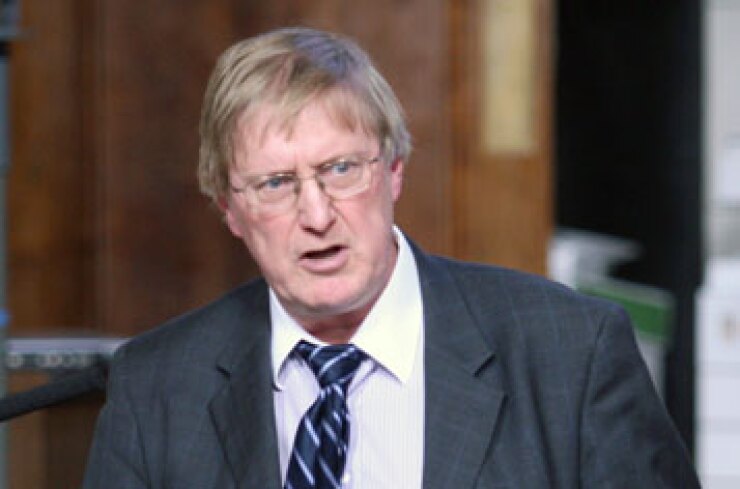
CHICAGO - A bill requiring Nebraska issuers to emphasize in offering documents if bondholders lack priority over pensioners could prompt national investors to shun Nebraska paper, some market participants warned state lawmakers.
Officials from some of the state's largest issuers, bond attorneys, and an underwriter testified against Legislative Bill 66 at the bill's first hearing Wednesday, in the Judiciary Committee.
LB 66 would require Nebraska issuers to disclose, in bold print on page one of all official statements, if bondholders have no priority over pensioners in the event of a bankruptcy. It would also require an issuer to state on the first page the amount of its unfunded pension obligation; its real estate valuation; and the real estate valuation minus tax revenue from tax increment financing districts.
Local officials could be held personally liable for misstatements or omissions if sued by bondholders, a measure that already exists in Nebraska law. Sen. Paul Schumacher, R-Columbus, introduced the legislation, along with another bill, LB 67, that would give bondholders clear priority over pensioners and other creditors in the event of bankruptcy. That bill, and a similar one that died last year, is an effort to address on a state level the national uncertainty surrounding pension versus bond debt following the bankruptcies of Detroit and Stockton, Schumacher said. LB 67 has not been heard yet in a committee.
The senator said he would like to see LB 67 passed, but if it fails again, then municipalities need to tell investors their position.
"If we're not willing to do what it takes to give the bondholders priority or set some ratio of priority between bondholders and pensioners, then . bondholders deserve to know up front that in the event of a bankruptcy they may have to fight for their position," Schumacher said Wednesday when introducing the bill to the committee.
But opponents told legislators that the federal Securities and Exchange Commission already polices disclosure and that the information required under the bill is not relevant to all bond issues and may spook investors.
"Institutional investors regularly review several offerings at a time," said Paul Grieger, an Omaha-based managing director with underwriting firm D.A. Davidson.
"Highlighting information that may or may not be material to credit quality may cause investors to pass on a Nebraska issue," Grieger said.
"That could result in higher debt costs for Nebraska and could lead to higher taxes to service the debt," he said.
"This change in the prospectus may be signaling that we may have problems that we don't actually have right now," said John Bonaiuto from the Association of School Boards, one of two statewide school groups to oppose the legislation. "It may make it more difficult to sell the bonds."
Bond attorney Joshua Meyer of Kutak Rock LLP, Omaha's bond counsel, told lawmakers that the SEC already regulates disclosure and has the power to hold local officials personally liable. The SEC wielded that power for the first time late last year, in Allen Park, Mich., when it held a former mayor personally liable for false and misleading information, Meyer said.
"We believe the SEC has the staff and the might to regulate this space and the state should not necessarily want to use its resources to regulate municipal disclosure," said Meyer.
He also pointed out that LB 66 does not distinguish between general obligation and revenue bonds. Information such as an issuer's total real estate valuation and unfunded pension debt is not germane to revenue bond issues, he said.
Some of the state's largest issuers, including the cities of Omaha and Lincoln and Lancaster County, also registered opposition. Omaha City Attorney Paul Kratz said the city already discloses most of the information in its official statements, and that most bond buyers realize all bets are off in a bankruptcy.
"In terms of pensions versus bonds, in a bankruptcy court you don't know what's going to happen, so I'm not sure that statement will add anything for a buyer of bonds," said Kratz.
When it comes to personal liability, Kratz added that most local officials are "very much aware of our responsibility and the liability that will come upon us if we make any misstatements."
Bond attorney Mike Rogers of Gilmore & Bell PC's Omaha office told lawmakers that some of the disclosure, particularly the TIF information, could be potentially misleading to investors, and that federal courts have already rejected a "bright line" on what is considered material to a bond issue.
No one spoke in favor of the bill.
Schumacher later acknowledged that the bill should probably distinguish between GO and revenue bonds, and said that the TIF disclosure "could be pulled out if it gives anyone heartburn." But otherwise, the criticism missed the point of the bill, the senator said.
"We need to bite the bullet here: either set some priorities between unions and bondholders in [LB 67] or let people know straight up what they're dealing with," said Schumacher.
The committee is expected to further discuss the bill in a closed-door session Jan. 26 or Jan. 27, and may or may not vote on it after that.





